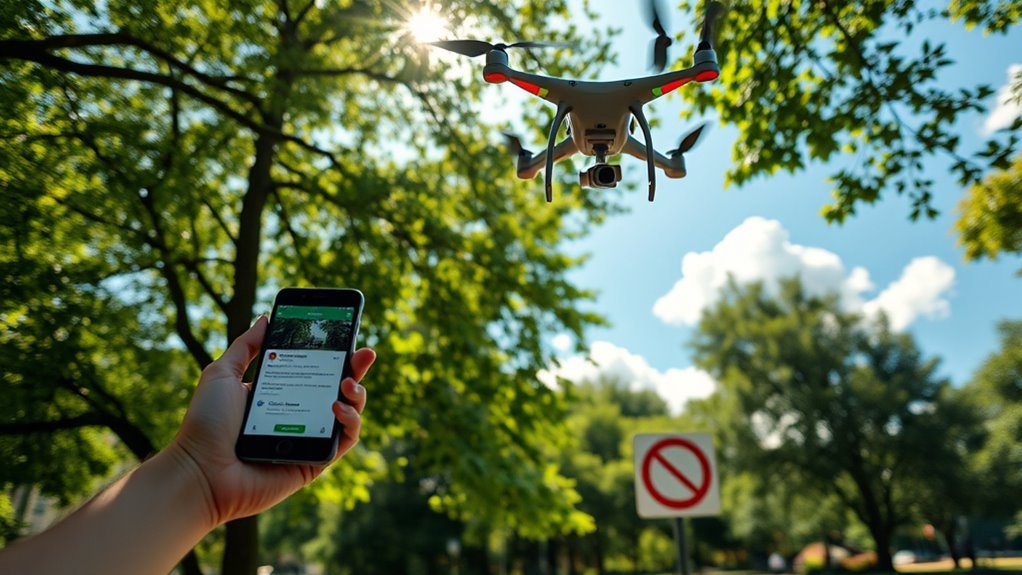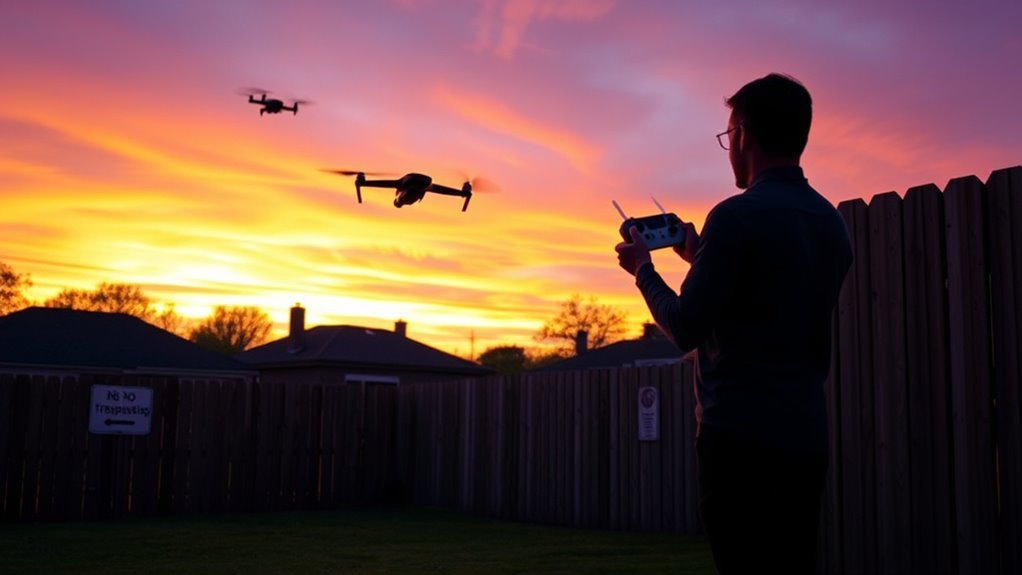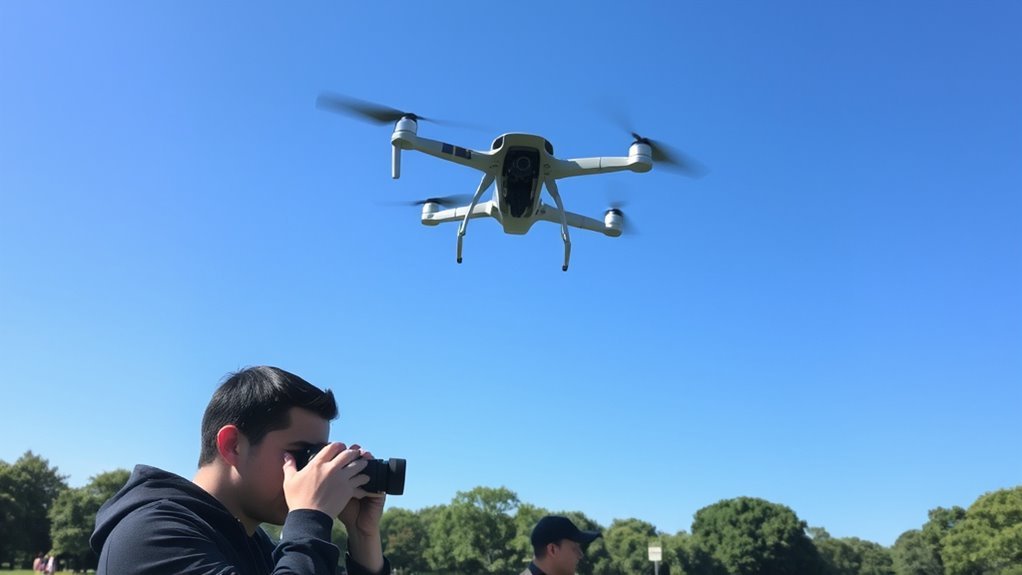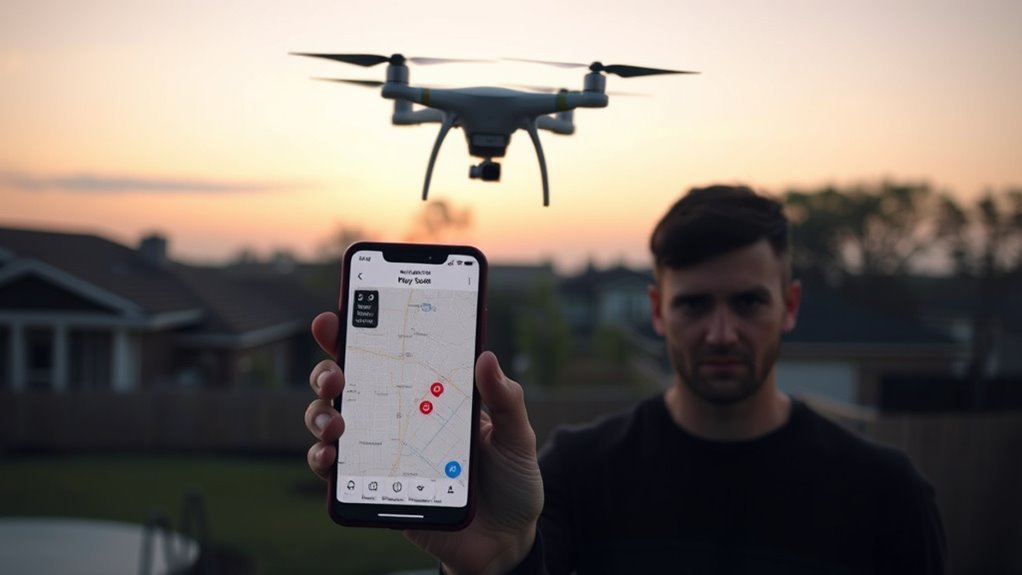To determine if you can legally shoot a drone, you must understand federal and local regulations governing airspace and drone operation. Your property rights typically don’t extend indefinitely upward, so you need to assess where your land ends. Also, consider privacy implications; a drone might infringe on your expectations of privacy. Liability risks for damaging a drone or harming others are significant. Exploring alternatives and solutions may be worth considering for resolving drone-related issues.
Understanding Drone Regulations and Laws

As you navigate the complexities of drone regulations and laws, it is vital to understand the legal framework governing drone usage in your area. Familiarizing yourself with drone classification regulations helps clarify the categories of drones and their operational limitations. These classifications are important, as they dictate whether you need specific licenses or can operate freely. Additionally, federal aviation guidelines set forth by the FAA outline safety protocols and airspace restrictions that all drone operators must follow. Ignoring these regulations can lead to penalties or legal repercussions. By grasping these laws, you empower yourself to operate within the legal boundaries, ensuring that your pursuit of freedom doesn’t infringe on others’ rights or safety. Moreover, understanding federal guidelines can help you assess the potential risks and legal consequences associated with drone interactions. Ensuring compliance with local regulations is essential for a responsible and lawful drone operation.
Assessing Your Property Rights

Understanding your property rights is fundamental when considering whether you can legally shoot down a drone. It’s essential to assess both your property boundaries and airspace rights. The law generally protects your right to defend your property, but the airspace above it can be more contentious.
Understanding your property rights is crucial when determining the legality of shooting down a drone.
- Know your property boundaries: Understand where your land ends and public airspace begins.
- Familiarize yourself with airspace rights: Generally, you don’t own the airspace above your property indefinitely.
- Consider local laws: Regulations may vary by jurisdiction, impacting your rights to act against a drone.
Evaluating Privacy Concerns

Privacy concerns play an essential role in evaluating your response to a drone’s presence over your property. When a drone engages in surveillance, it can infringe upon your expectation of privacy. You need to reflect on whether the drone’s activities violate any local laws regarding privacy and surveillance. Legal implications can vary by jurisdiction, but generally, capturing images or videos of you without consent may be problematic. Understanding these laws can help you determine an appropriate course of action. If the drone is clearly invading your privacy, you might have grounds to take action. Balancing your rights with the legal framework surrounding drone surveillance is vital to ensuring you protect your freedom while adhering to the law.
Safety and Liability Considerations
When considering the legality of shooting down a drone, it is crucial to assess the potential safety and liability issues involved. Engaging in such actions can have serious consequences, both for you and others. Here are some key considerations:
- Drone safety: Shooting a drone may endanger people or property if it crashes uncontrollably.
- Legal liability: If you hit an unintended target, you could face criminal charges or civil lawsuits.
- Liability insurance: Confirm you have adequate coverage since damages may exceed your expectations.
Understanding these factors is critical. The freedom to act doesn’t negate your responsibility for the safety of those around you. Weighing these elements will help you make an informed decision regarding your rights and liabilities.
Alternatives to Taking Action Against Drones
Instead of resorting to drastic measures like shooting down a drone, consider exploring alternative actions that can address your concerns more safely and effectively. Utilizing drone detection technology can help you identify and track drones operating in your vicinity, allowing you to understand their purpose. If a drone is invading your privacy or causing disturbances, you can document the incidents and report them to local authorities. Additionally, various anti-drone solutions exist, such as signal jammers or drone nets, though their legality may vary. Engaging with community groups or local lawmakers about your concerns can also promote awareness and encourage the development of regulations. These alternatives prioritize safety and legal compliance while still advocating for your rights and freedoms.
Frequently Asked Questions
Can I Shoot a Drone if It Invades My Airspace?
If a drone invades your airspace, you might feel your privacy’s compromised. However, airspace rights can be complex; shooting a drone could lead to legal consequences. It’s essential to understand the laws governing drone privacy and airspace.
What Should I Do if I See a Drone Over My Property?
If you see a drone over your property, assess its purpose. Understand your drone privacy rights and property rights. Document the incident, as it may help clarify any legal concerns regarding intrusion or unauthorized surveillance.
Are There Specific Laws for Shooting Drones in Urban Areas?
In urban areas, drone safety concerns necessitate strict urban drone regulations. You’ll need to familiarize yourself with local laws, as shooting a drone can lead to legal repercussions, despite your desire for personal freedom and property protection.
Does My State Have Different Drone Shooting Laws?
Finding your way through the maze of state regulations can feel like hunting for treasure. Each state has unique drone laws that determine what’s permissible regarding drones, so it’s essential you research your local statutes before taking any action.
Can I Use a BB Gun to Shoot Down a Drone?
You can’t legally use a BB gun to shoot down a drone, as it may infringe on property rights. Drone defense laws vary, so understanding your state’s regulations is essential before taking any action.

